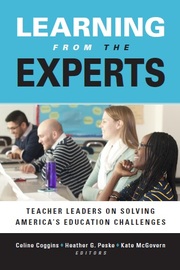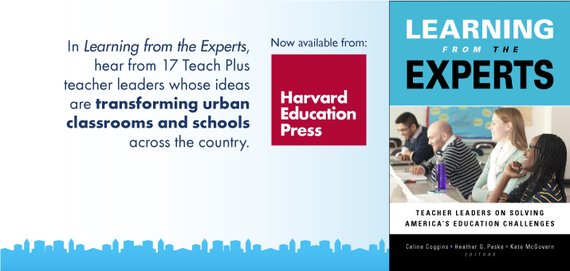Published by Harvard Education Press, Learning from the Experts: Teacher Leaders on Solving America's Education Challenges is a celebration of teachers as change makers. In it, readers will hear from 17 teacher leaders whose ideas and tenacity are transforming urban classrooms and schools nationwide.
This week, read an excerpt from Chapter One: Creating and Using Data in Schools by Michelle Morrissey and this new essay by Shane Donovan.
What Data Can Do For Schools
Shane Donovan
Jessica raised her hand. "Mr. Donovan, can I see the questions I missed on the quiz? I really thought I was going to pass this one." Jessica was taking an online assessment in my physics class and could see that she was one question short of mastering the standard immediately after she finished. She wanted to know exactly which question she had missed so that she could complete extra practice assignments aligned to that question and then re-take her quiz during my office hours. Using data strategically can lead to huge gains in student learning and encourages students to take ownership over their progress. However, there is also a dark side of the way data is currently used in schools. How do we use data meaningfully in schools without demeaning the craft of teaching to a series of graphs and charts?
Data's promise is that of increased clarity and strategic actions on the part of all teachers. Data unleashes a teacher's inner detective: How is my student's understanding of ratios linked to the way I taught improper fractions? Why do my students master questions that are related to visuals but struggle with word problems? Data can motivate students and communicate progress clearly. It can lead to insights about subgroups of students that a teacher might never see without that data. My Spanish speaking students, for example, were struggling with Physics notation because of how adjectives and nouns are ordered in Spanish compared to English. I never would have realized this without comparative data.
The dark side of data, though, is truly dark. Using data poorly can reduce learning to an exclusively extrinsic thing; I must learn so I can get X% on this test. It can tempt us to reduce what we teach and what we expect our own students to learn to things that can be measured on a standardized test; complex reasoning, collaborative problem solving, and creativity are vital components to a child's education, and multiple choice questions alone are not the best way to assess those skills. Data can also demean the teacher-student relationship by turning it into an input-output relationship rather than one of collaboration, mutual respect, and nurturing; as a friend put it "our testing regimen makes me feel like I'm trying to grow a prize-winning pumpkin by measuring it every day instead of watering it."
How do we tap into data's promise and avoid its dark side? First, we need to think deeply about how we speak to our kids about data. We must emphasize growth and progress, revision and reflection. Second, we should promote and celebrate how using data has led not just to growth in test scores, but other forms of meaningful academic progress. We can show students how their improved grammar quiz scores correlate with the quality of their essays. After a science lab we can show students how simple the standardized test questions are by comparison and then celebrate their deep understanding. When data is used this way, teachers are able to use it to quantify and analyze meaningful learning and truly improve our instruction.
Shane Donovan is a current Teach Plus Teaching Policy Fellow in Washington, DC. He has been teaching physics for four years and is starting his second year at EL Haynes Charter School in the Petworth neighborhood of DC. Shane has worked in teacher development as a teacher coach and school director for Teach for America's summer institute, and thinks a lot about how to teach science in a meaningful way.
Want more from Learning from the Experts? Read an excerpt from the introduction by Teach Plus CEO Celine Coggins.

